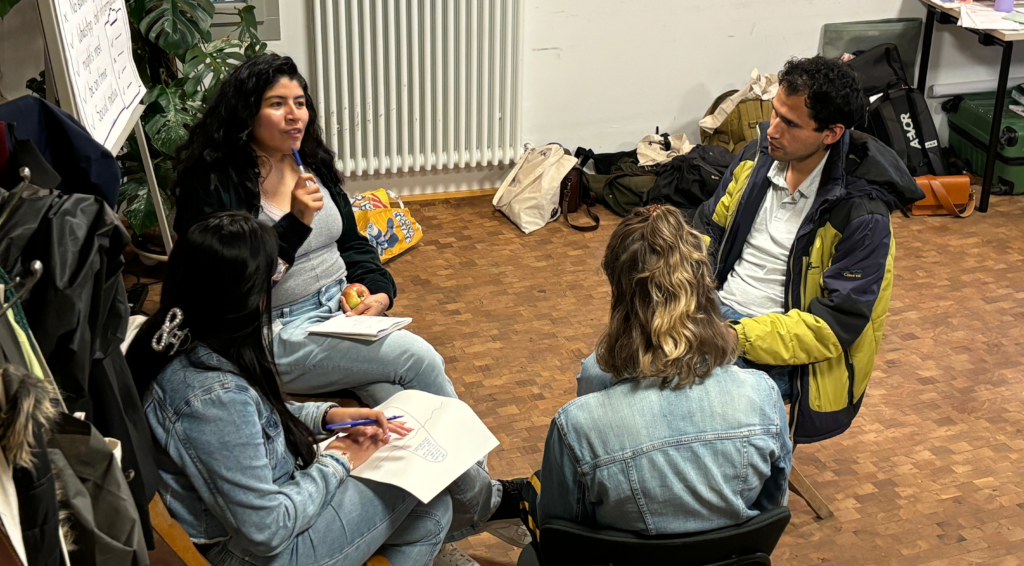
An Interview with Youth Ambassadors Clifford Ibrahim (Nigeria), Katherine Meza Alegre (Peru), and Musung Mun (South Korea)
By Seraina Willi, Barbara Grass (Mission 21), and Dorothea Schiewer (KOFF/swisspeace)
When Mission 21 talks about expanding intercultural and transcultural skills, it is with the understanding that these are essential basic skills for living together peacefully in diversity. Intercultural skills are needed to recognize, understand and differentiate differences. In transcultural competencies, intercultural competencies and the understanding gained through them are combined with self-reflection and communication skills in to recognize resources and create solutions collectively. And not to remain stuck in difference.
The Youth Ambassador Program 2023-2025, organized by young@mission21, is an exchange initiative for young adults. It aims to transform participants into advocates for peace and justice through their gathered experiences This initiative gathers over 30 participants from 15 countries across Africa, Asia, Europe, and Latin America. This summer, these young leaders convened in Switzerland for a two-week intercultural exchange, engaging deeply with the complex relationship between culture and peace.
In this interview, Clifford Ibrahim from Nigeria, Katherine Meza Alegre from Peru, and Musung Mun from South Korea shared their experiences and perspectives on the impact of cultural dynamics on global peace efforts.
They unanimously agree that culture can be both a source of harmony and a driver of conflict. Clifford Ibrahim describes culture as a dynamic blend of beliefs, values, traditions, and behaviors that shape group identities. Katherine Meza Alegre adds, “There is no inherently good or bad culture, but there are constructive and destructive cultural practices, especially when it comes to acquiring power or resources.” Misunderstandings and conflicts often arise from differing cultural practices and interpretations. Despite these challenges, Musung Mun is convinced that culture holds the potential to foster understanding both of oneself and others.
The focus of the youth ambassadors’ meeting in the summer of 2024 was precisely on this understanding of others and oneself. In the diverse group, controversial topics were discussed. Musung Mun describes the experience as follows: “We mainly discussed various topics related to injustice such as the climate crisis, gender conflicts, or gender-based violence and war. We spent more than two weeks reflecting together on how we experience these issues and how we want to address them, which expanded our understanding of the phenomena that occur in our own culture and in the cultures of others.” The participants actively engaged in exchange, adopted new perspectives, and learned from each other, thus deepening their intercultural and transcultural competencies.
Such encounters can obviously lead to personal boundary experiences, even if one is as open and interested as possible. Reflecting on how to handle these boundaries is considered by Mission 21 as an important learning process: Sometimes it is necessary to endure differences that may cause much misunderstanding and do not allow for quick compromises. Often, participants find this experience valuable: despite very different perspectives, they share experiences and find common ground.
The three interviewed youth ambassadors emphasize the importance of developing an awareness of other cultures and their differences. At the same time, Katherine Meza Alegre highlights: “It’s less about bridging cultural differences and more about learning to deal with them. There are reasons for these cultural differences, and they also have their own value.”
This is exactly what coexistence mean: that we listen to each other, try to understand, accept that we cannot or need not to understand everything, and see people in their diverse aspects rather than focusing only on differences. Clifford Ibrahim describes it from his perspective: “The program contributes to peacebuilding by fostering exchange, empathy, respect, and a deeper understanding of diverse cultures, breaking down stereotypes. It empowers people to become active agents of change by equipping them with the skills and confidence to address conflicts in their communities.”
The current program (2023-2025) is generously supported by the Movetia Foundation and the Wegweiser Foundation.